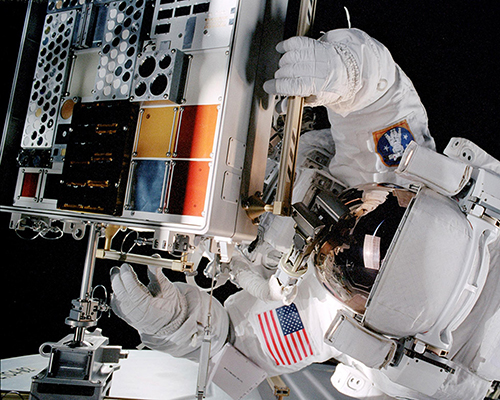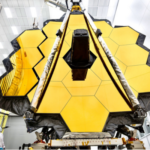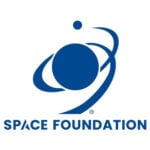Space Foundation Press Releases
2019 Space Employment Hit 8-Year High, Launch Activity Reached Decade Growth of 39%, Research from The Space Report Q1 Analysis Shows
Written by: Space Foundation Editorial Team

COLORADO SPRINGS, Colo. (March 31, 2020) — Across multiple fronts, the space industry heading into 2020 was the strongest in years, with gains in space industry jobs, new nations entering space, and record-level research and investor activity through International Space Station U.S. National Laboratory programs.
Those are among the new findings in The Space Report 2020, Quarter One, released today.
More than 183,000 workers were employed in the U.S. space workforce at the end of 2019, according to the U.S. Bureau of Labor Statistics. Core employment, those jobs most closely aligned with the space industry and not the larger aerospace industry, rose to 141,520 jobs in 2019. This represents a 4.1% increase from the 135,930 private sector workers in 2018 and marks the third year in a row of increasing employment in this workforce and the highest level since 2012.
Some sectors saw significant gains in employment over the last five years. Together, the workforce supporting manufacturing of space vehicles, space vehicle propulsion units, and other space vehicle parts grew by nearly 20% over the past five years, adding more than 14,000 new employees. Other sectors experienced decline. Broadcast and wireless communications equipment manufacturing employment decreased 9.8% over the past five years, shedding more than 5,000 workers.
2020 Economic Outlook
The COVID-19 pandemic is expected to drastically change the trajectory of the 2020 economy, but the sector is better insulated from market upheaval, industry experts advised The Space Report.
Courtney Stadd is a management consultant who has worked in the commercial space industry for 40 years. He is president of Capitol Alliance Solutions, LLC, a Maryland-based an aerospace management consulting firm.
“The diverse nature of our industry — from Fortune 500s primarily dependent on the federal government to a mix of entrepreneurial ventures dependent on domestic and foreign commercial customers — may help mitigate some of the devastating effects being witnessed in other more vulnerable sectors such as travel/leisure,” Stadd said. “Many space companies offer
communications and imaging services that contribute to our national security, while providing critical communication connectivity that is of paramount importance to a society in a safe harboring mode — and therefore may warrant additional support from our government.”
Meagan Crawford, managing partner of SpaceFund, says smaller startup companies should expect to feel the brunt of the economic upheaval.
“The economic impact of this situation may be most acutely felt by the smaller businesses in the booming space startup sector,” Crawford said. “These companies could be drastically affected by delayed launches (resulting in a delay of revenue for the satellite companies), and by the inevitable slowdown in the investment sector as the private investors and venture capitalists the industry relies on are maintaining their liquidity in these uncertain times. Small startups and even medium-sized space companies will often have small cash reserves and may not be prepared for such disruptions.”
The time it takes to recover economically will depend in part on how long isolation is required, Stadd noted.
“If the COVID-19 rapidly diminishes in terms of threat over the next few months, the good news is that our industry’s fundamentals — access to low interest capital, available talent eager to return to work and a battered economy looking to rapidly recoup lost productivity — are such that we should be able to regain forward momentum by year’s end or first quarter 2021.”
Other 2019 Performance Indicators
Some of the other highlights from the latest edition of The Space Report:
- Global launch attempts increased 39% in the last decade, and with 103 launch attempts in 2019, averaged almost two a week.
- The number of new nations in space now represents more than half the countries in the world; 82 nations have spacecraft in orbit, but with fractional ownership and other expanded criteria, the total climbs to 102.
- Research and investment activities hit record levels on the International Space Station U.S. National Laboratory. Astronaut utilization hours for on-board research climbed to an all-time high of 967 hours in 2019, more than a 27% increase in hours from 2018. Investor interest is also growing stronger. The ISS National Laboratory grew its investor members to 157 last year, a 33% increase from 2018. National Laboratory estimates that investors in the network are managing more than $420 billion in assets.
About the Space Foundation
Founded in 1983, the Space Foundation is a 501(c)(3) nonprofit and the world’s premier organization to inspire, educate, connect, and advocate on behalf of the global space community. It is a leader in space awareness activities, educational programs, and major industry events, including the annual Space Symposium. Space Foundation headquarters is in Colorado Springs, Colo., USA, and has a public Discovery Center, including El Pomar Space Gallery, Northrop Grumman Science Center featuring Science On a Sphere®, and the Lockheed Martin Space Education Center. The Space Foundation has a Washington, D.C., office, as well as field representatives in Houston and on the Florida Space Coast. It publishes The Space Report: The Authoritative Guide to Global Space Activity, and through its Space Certification™ and Space Technology Hall of Fame® programs, recognizes space-based innovations that have been adapted to improve life on Earth. Visit both websites — www.SpaceFoundation.org and DiscoverSpace.org — and follow us on Facebook, Twitter, Instagram, LinkedIn, and YouTube.
# # #
A Message from Our CEO
As a world and an industry, we are in the midst of a global health and economic crisis. While there may be uncertainty about how we will recover, there is no doubt that the same ingenuity, drive, and collaboration that serves our exploration and industrialization of space will lead us to a swift recovery.
In just the last weeks, the U.S. Food and Drug Administration cleared use of a new corona virus test that returns results four times faster than existing diagnostic machines. We’ve seen scientists from around the world share and integrate the genome sequences of dozens of corona virus strains to spur development of a vaccine — a result aided by the space and satellite technology that allows split-second global communication.
During this recovery, we find ourselves at an unusual demarcation between the relative stability of the world before corona virus and the fluidity of present day. That will be important to remember as you read The Space Report 2020, Quarter One. The analysis it provides is built from data and market conditions that existed before the spread of the global pandemic. In the coming months, it should be expected that everything we track about the space industry and market conditions will undergo dramatic change.
As with any analysis, it is crucial to have benchmarks that will help us analyze change and develop trend lines, and that is one role The Space Report plays. But as we move forward, you will be able to rely on the Space Foundation and its research to provide insight and understanding about how the space industry is changing and adapting to our new reality. Our updates aren’t limited to quarterly editions; you will find fresh analytics on The Space Report Online as they come available.
For 37 years, the Space Foundation has been an energetic advocate for the global space community. Through our annual Space Symposium and The Space Report, we provide research and insight valuable to the global scientific and business community. As a global space connector — both through symposium and our programs — the Space Foundation is in the unique position to assemble the entire spectrum of stakeholders across the space industry. Our business development programs help connect and support space industry entrepreneurs and explore the multitude and diversity of space-industry jobs, careers, and business pathways the space economy offers. As important as symposium, The Space Report, and these programs were before this pandemic, we see them as vital components to the economic recovery of the space industry and the fulfillment of our larger mission to be a trusted source of space information and a provider of exceptional forums for the exchange of ideas. Through these initiatives, we all will emerge stronger than ever.
Best regards,
Tom Zelibor
Rear Admiral, USN (Retired)
Chief Executive Officer, Space Foundation


